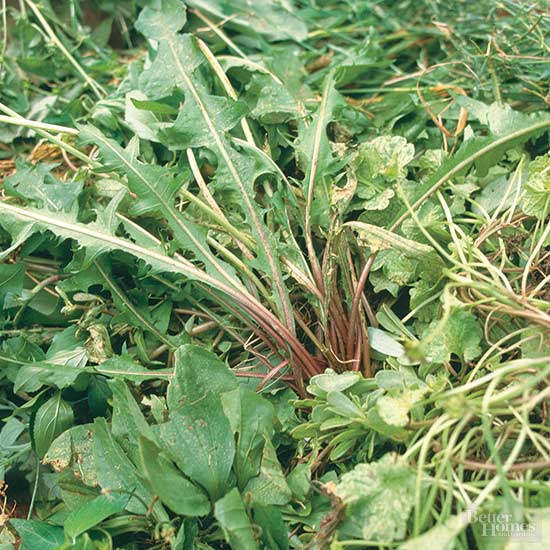






Everyone seems to want a magic potion to spray on weeds to make them disappear with ease -- without harming the environment. Guess what? That's as elusive as a magic wand! But there are a few things you can do to kill weeds.
Identify the weeds in your yard with this guide.
Pull weeds before they set seeds. Weeds are the comeback kids of the plant world. Their offspring can return to haunt you for years. Pull weeds as soon as you see them, when they're too small to reproduce. Do this faithfully and you will see a marked difference in the number of weeds in future years. Be sure to pull the entire weed, including all of its roots. Use a tool to help you dig deep to unearth weeds with deep taproots, such as dandelions.
Mulch to prevent weed growth. Mulch helps keep moisture in soil, and it suppresses weeds because it blocks light, thus preventing seed germination. Organic materials such as chipped or shredded bark are good choices. Landscape fabric or plastic are effective barriers, but they also reduce water and oxygen movement into the soil, basically blocking it from all life.
Pour boiling water on the weeds. This is an effective way to kill weeds between cracks of cement or gravel paths. Be careful; the boiling water kills everything it touches, not just weeds.
Use a propane torch to burn the weeds.
The Best Way to Clear a Weed-Infested Flowerbed
continue reading belowPre-emergent herbicides prevent annual weed seeds from sprouting. Apply pre-emergents in the spring before most weeds emerge. The products stop seeds from germinating, so avoid using a pre-emergent in vegetable and flowerbeds where you plan to sow seeds.
Vinegar weed killer containing 20 percent acetic acid should only be applied when you wear full protective gear. Vinegars with acetic acid concentrations of 11 percent or greater can burn skin, cause severe eye injuries, and irritate skin. Prolonged or repeated exposure can cause dermatitis and chronic bronchitis, and erode teeth.
Never mix Epsom salt, vinegar, and dish soap, as salts and soaps are toxic to the environment.
How to Kill Weeds Naturally
Glyphosate, the active ingredient in Roundup and other products, can be safely used if label directions are followed, according to the U.S. Environmental Protection Agency. The EPA is currently reviewing its recommendations for glyphosate. As of now, these are the current recommendations according to the EPA: "Glyphosate has low toxicity for humans. Glyphosate is no more than slightly toxic to birds and is practically nontoxic to fish, aquatic invertebrates, and honeybees. Certain products contain an ingredient that is toxic to some fish. Protective eyewear is recommended for the few products that may cause eye irritation. Follow the label directions to protect fish and aquatic environments."
Copyright © www.100flowers.win Botanic Garden All Rights Reserved